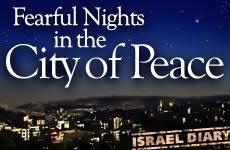 Iran’s Attack on Israel
Iran’s Attack on Israel


3 min read
4 min read
4 min read
4 min read
I peered into the eyes of my 11-year-old daughter. Yes, I said. If the worst should happen we must not be afraid because there is meaning to living as a Jew.
Yom Kippur night. I am tired as midnight approaches. My wife and I sit peacefully in our living room, absorbing the events of the last two weeks. The cumulative stress of coping with daily terrorism and fearing for my children's lives is tempered by the tangible holiness of the day. And yet there is that eerie feeling of the calm before the storm.
Virtually every night for the past year and a half, we have listened to gunfire outside our window. At first we wondered whether it was the fireworks that are a common feature at Moslem weddings. But one doesn't have to be a Mossad agent to differentiate between rapid machine-gun and fireworks.
At one point in the past, I'd called the local police station.
"Yes, we know about it. Nothing can be done. It's coming from Area A, which is under full Palestinian control."
"Why do they need to carry out target practice at 1:00 in the morning?"
"We don't know. Tell your children to go back to sleep."
I was left to wonder. What are they practicing for? The long awaited peace...?
I read about a Palestinian police force of 12,000 allowed by the Oslo agreements, that illegally grew to a strongly equipped army of 40,000...
I am jolted back to the moment. I'm about to head for bed when my wife calls me to the window. I peer out into the night and strain to identify the source of the yelling and chanting echoing from across the valley. We live in the last row of homes on the northeast edge of Jerusalem. On a hill directly opposite us, about 300 yards away, is the Arab village of A-Ram.
The sounds intensify and I make out a group of 30-40 young men working themselves into a frenzy. I can only describe it as a war dance.
The group then takes a huge barrel filled with gasoline and rolls it down into the valley that separates our homes. Some trees catch fire. In the past, they'd set fire to the grove of trees my 6-year-old calls “the forest” when he begs me to take a walk with him on Shabbat. This is something for which my suburban Toronto upbringing has not prepared me.
Our Arab neighbors always seem to start up on Shabbat and holidays. Yet Jewish law is clear: Even Yom Kippur -- the holiest day of the year -- must be set aside to protect lives.
So I decide to act. But how? The baseball bat I brought from Canada will not protect my five sleeping children or my wife. I run into the street to find the hired guards I helped organize in response to the thefts, stabbings and shootings our neighborhood has continually been subject to from our cousins across the hill.
The street is empty. My heart is pounding and my mind is searching for answers -- quick answers. I pound on my neighbor's door. He's a sort of community leader and a clear thinker. Good -- he's still awake -- but unaware of what is taking place outside his porch window.
We look out together and see tracer bullets coming from a different direction. The Israeli soldiers have put a damper on the war dance. The shooting dies down quickly. Is it a pause, or is it over, for now?
We discuss alternatives and after 15 minutes pass quietly, I return to my home. For a long time my eyes are glued to the hill, as I think of what all this means. At last I go to bed, deciding not to tell my children what I've seen.
A few days later I sit in my Sukkah, little protected by the shaky plank walls and thatched roof of our simple hut, and explain to my children something I feel they need to know. Jews have always taught that if someone comes and murders you just because you're a Jew, your death is a Kiddush Hashem, a sanctification of God's name. Somehow that teaches the world about God.
But what does this mean? It means that for thousands of years Jews have tried to live peacefully as Jews, with our values of love, peace, God and morality -- and we've been hated, hunted and gassed because we stood for something that others couldn't stand.
I peer into the eyes of my 11-year-old daughter; eyes that seemed to understand my words better than I could even speak them. Yes, I said. If the worst should happen we must not be afraid because there is meaning to living as a Jew. Perhaps we can appreciate just how meaningful it is when others try to destroy us for it.
